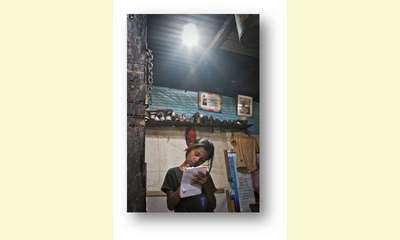|
|
La solidaridad elimina la oscuridad
an article by Natalia Rocha and Omar Salinas
Video: Un invento
interesante con una botella de plástico)
Debido a que las personas cuentan con recursos económicos
limitados, el tema del desarrollo sustentable se ha vuelto crucial
para mejorar la calidad de vida de los mismos. El video “Un
invento interesante con una botella de plástico” muestra cómo la
población puede crear alternativas a las energías tradicionales a
través de la solidaridad, un elemento clave para la construcción de
la Cultura de la Paz. 
La luz del desarrollo
click on photo to enlarge
La reutilización de desechos que,
comúnmente irían a parar a la basura, son el elemento esencial
para iluminar cada una de las casas mostradas de Maligaya, un
pequeño poblado en Filipinas que debido al tipo de construcción
de sus casas, carecen de luz solar y de los recursos económicos
suficientes para pagar el servicio de energía eléctrica a lo largo del
día.
La mezcla de botellas de plástico, cloro y agua, instaladas en el
techo de cada hogar facilitan que la luz solar entre a las casas
como si se tratara de una bombilla eléctrica. Estas botellas solares,
que surgieron de la idea de uno de los habitantes, ha beneficiado a
643 casas y ha mejorado el desarrollo humano de las personas al
tener acceso a uno de los servicios indispensables para ser
productivo. Pero además, ha contribuido a fomentar la
participación ciudadana, ya que todas las personas contribuyen al
desarrollo de su comunidad y se involucran en las actividades.
Finalmente, lo que para muchos sería un problema socio-
ambiental, para una comunidad la botella solar contribuye a la
Cultura de la Paz.
( Clickear aquí para la version inglês)
|








|
DISCUSSION
Question(s) related to this article:
What renewable technologies can best meet Third World energy needs?,
* * * * *
Latest reader comment:
The following report comes to us via The Good News Agency which is available on the Internet at http://www.goodnewsagency.org.
Meeting the food security challenge through organic agriculture.
States should integrate organic agriculture objectives within national priorities, FAO says.
Rome, 3 May – “Organic agriculture is no longer a phenomenon in developed countries only, as it is commercially practiced in 120 countries, representing 31 million hectares and a market of US$ 40 billion in 2006,” FAO underlines in a paper Organic Agriculture and Food Security presented here at an International Conference on Organic Agriculture and Food Security (3-5 May 2007).
The paper identifies the strengths and weaknesses of organic agriculture with regards to its contribution to food security. analyzes attributes of organic supply chains against the Right to Food framework and proposes policy and research actions for improving the performance of organic agriculture at the national, international and institutional levels.
“The strongest feature of organic agriculture is its reliance on fossil-fuel independent and locally-available production assets. working with natural processes increases cost-effectiveness and resilience of agro-ecosystems to climatic stress,” the paper says.
“By managing biodiversity in time (rotations) and space (mixed cropping), organic farmers use their labour and environmental services to intensify production in a sustainable way. Organic agriculture also breaks the vicious circle of indebtedness for agricultural inputs which causes an alarming rate of farmers’ suicides.”
The paper recognizes that “most certified organic food production in developing countries goes to export” and adds that “when certified cash crops are linked with agro-ecological improvements and accrued income for poor farmers, this leads to improved food self-reliance and revitalization of small holder agriculture.” (…) Organic Agriculture website: http://www.fao.org/organicag/
http://www.fao.org/newsroom/
For more recent news, see:
Renewable Energy Investments: Major Milestones Reached, New World Record Set
For articles since 2016, click here .

|
|








